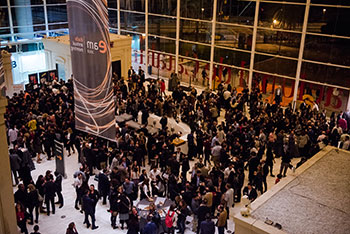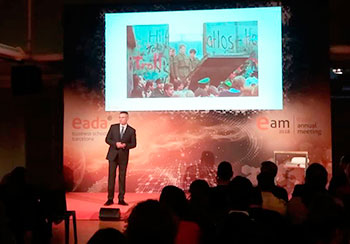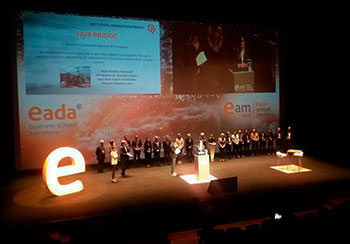EADA Annual Meeting 2018: Learning transformation
 The unbeatable setting of the National Theatre of Catalonia hosted the EADA Annual Meeting 2018, with a full house of 1,200 people registered for the event. Under the motto ‘The next act: learning transformation’, this latest edition helped us to better understand the new ‘VUCA’ reality (‘volatile, uncertain, complex, ambiguous’).
The unbeatable setting of the National Theatre of Catalonia hosted the EADA Annual Meeting 2018, with a full house of 1,200 people registered for the event. Under the motto ‘The next act: learning transformation’, this latest edition helped us to better understand the new ‘VUCA’ reality (‘volatile, uncertain, complex, ambiguous’).
According to Carles Brugarolas, professor in the field of Strategy, Leadership and People at EADA and moderator of English-language lectures, the VUCA concept adds meaning in terms of visions of the future, understanding the new environment, finding meaning in chaos (clarity) and speed to respond quickly and efficiently to the series of changes. In the same way, Joan Miquel Piqué, Head of the EADA Leadership and Management Department and moderator of Spanish-language lectures, reflected on the speed of the change we are undergoing at every level: technological, economic, business and personal. In his opinion, “it requires of us to pay constant attention to what’s going on, analyse how changes take place, how they can affect us and how we can take advantage, both personally and professionally.”
The EADA associate professor in Organization, Strategy and Communication, Antonio Blanco-Gracia, stressed that the organisations that adapt fastest to these changes will be the most competitive: “Internet culture is going to become a major competitive advantage.” Blanco believes that volatility is synonymous with decentralisation, the complexity of open knowledge (collective intelligence), and uncertainty and reputational ambiguity –noting a difference between “reputation for what you are vs. reputation for what you do–.
Innovation
 Innovation linked to change and to transformation were also topics of conversation. For instance, Clara Remacha, a 2015 EADA Master in Management graduate and currently working in 3D Printing Customer & Market Development at HP Inc, explained that “3D printing will establish new paradigms in the design, manufacture and distribution of new products.” She added that this digital transformation entails a change of mentality because it is a multi-faceted change affecting every area in an organisation, as it has an impact on society and all stakeholders.”
Innovation linked to change and to transformation were also topics of conversation. For instance, Clara Remacha, a 2015 EADA Master in Management graduate and currently working in 3D Printing Customer & Market Development at HP Inc, explained that “3D printing will establish new paradigms in the design, manufacture and distribution of new products.” She added that this digital transformation entails a change of mentality because it is a multi-faceted change affecting every area in an organisation, as it has an impact on society and all stakeholders.”
Another technology changing the economic and financial paradigm is Blockchain. Aleix Ordeig, founder and CEO of the Blockchain Institute & Technology, EADA partner with whom we are launching a new Postgraduate course in Blockchain Business, spoke about this. He mentioned the new dynamics of the cryptocurrency market and how smart contracts are changing the way of doing business around the world. He also noted the legal changes due to the Blockchain technology.
In turn, Julien Manguette, LinkedIn Account Director, focused on how the new VUCA reality had affected the labor market. His lecture looked at the new Gig Economy concept, a new employment model involving project-based work, with no exclusivity towards the hiring company. It’s a trend that’s on the up, requiring online flexibility and communication, because the employee can be thousands of kilometers away, and it allows a better work-life balance. “This is the future of the labor market: self-employed workers, freelancers, flexibility, mobility, offshoring,” he added.
Furthermore, Simone Van Neerven, Vueling Innovation Lab manager, added another idea: “This new environment means organisations have to work together and share synergies.”
Social transformation
At the EADA Annual Meeting 2018, there was a lot of talk about social transformation. For example, Ph.D. Jatinder J. Singh, EADA Professor of Marketing, spoke about Business Ethics, or the need for companies to put the social impact of their activities above purely economic motives. He stated that “customers buy products and services from brands that promote and participate in several social actions, such as charity programmes in the Third World or responsible use initiatives.”
Similarly, Josep Maria Coll, Director of the EADA Master in Sustainable Business & Innovation, highlighted the benefits of applying a harmonious approach in companies. This is known as Zen Business, a new business paradigm wherein money is the means and social impact is the end. Coll believes that “companies that have a greater social and environmental impact and that also guarantee the personal and professional development of their workers, end up building unique brands that become market leaders and are highly profitable.”
Institutional part
 After the lectures, David Parcerisas, President of the Board of Trustees of the EADA Foundation, stated that “EADA has also adapted to the new VUCA reality, investing in new, short-term programmes, such as Trend Lab, in new methodologies, like the Collbató Residential Training Campus outdoor training zone, and in the new Barcelona campus to be inaugurated in Spring 2019, which will enhance the educational experience for students.
After the lectures, David Parcerisas, President of the Board of Trustees of the EADA Foundation, stated that “EADA has also adapted to the new VUCA reality, investing in new, short-term programmes, such as Trend Lab, in new methodologies, like the Collbató Residential Training Campus outdoor training zone, and in the new Barcelona campus to be inaugurated in Spring 2019, which will enhance the educational experience for students.
Parcerisas used his lecture to give both Alumni and current students some advice: “Don’t forget your roots, work in something you're passionate about, add ethical values to all your projects and, above all, don’t do anything you couldn’t explain in the future to your children.”
The ceremony ended with prizes being handed out for the best 2017-18 academic year projects for the MBA, Executive MBA and International Masters and the Càritas honorary distinction for the project with the best social content. The winners highlighted teamwork, experiences and good moments shared during project development, faculty support, the ethical values on display in the classroom and the input from the leadership sessions at Collbató. They all agreed that this was one of the best decisions they had taken, “because it led to extensive personal and professional growth.”
